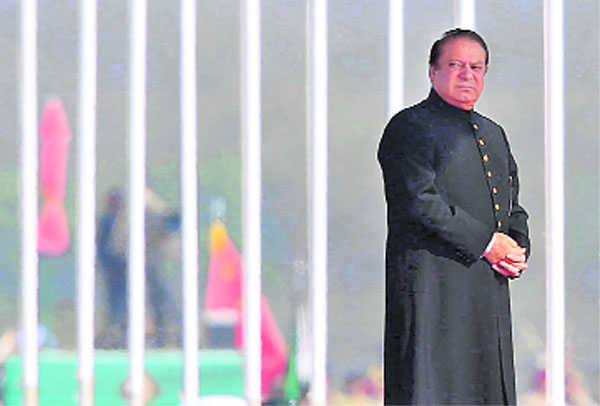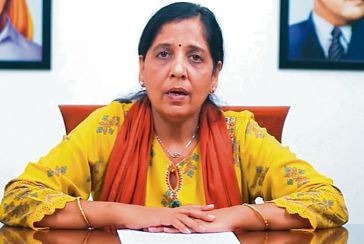
In spot: Sharif’s political future and the fate of his family is in the army’s hands.
Vivek Katju
WITHIN a few months of taking over, Pakistani army chiefs feel the need to send sharp messages to their country’s political leadership that they will not allow the dignity of the institution they lead to be trifled with. They also send signals both to their own elected government as well as to Delhi that the buck stops with them in the making of Pakistan’s India policy. Gen Qamar Bajwa who took over as the army chief five months ago has not been an exception. He has delivered messages on both fronts.
Last October, the Dawn newspaper reported that at a top level meeting where PM Nawaz Sharif was present his brother, the powerful chief minister of Punjab, Shahbaz Sharif, rebuked the then DG ISI for putting pressure for the release of terrorists arrested by the law enforcement agencies. At the same meeting, the then Pakistan foreign secretary said inaction against terrorist groups such as the Lashkar-e-Toiba, the Haqqani Network and the Jaish-e-Mohammad was leading to the country’s isolation.
The report was denied but the army was furious at the leak of even an ‘inaccurate’ account of a sensitive meeting. Its real anger was, of course, at it being projected at the receiving end of a civilian tirade. It compelled Nawaz Sharif to appoint a committee chaired by retired judge Aamar Raza Khan with intelligence agencies representatives, including the ISI’s, along with others as members. The committee submitted its report to the interior ministry on April 25. A day later, it reached Nawaz Sharif’s office. On April 29, Sharif’s office conveyed to the ministry that the PM had inter alia approved that the foreign policy charge of his influential special assistant Tariq Fatemi be withdrawn and that appropriate action be taken against the government’s principal information officer (PIO). In the wake of the Dawn report, the information minister had resigned in October itself. Obviously, the report, which has not been released, had passed strictures of some kind against Fatemi and the PIO.
No sooner was Sharif’s decision made public, the DG ISPR, Maj-Gen Asif Ghafoor tweeted, ‘Notification on Dawn leak is incomplete and not in line with the recommendations. Notification is rejected.’ Clearly, the army’s swift and brutal response was to put the Sharifs, already weakened by the Panama leaks case, on the mat. It was also to show that the army’s honour would be satisfied only if the PM was to sacrifice someone close to him; it is widely believed that Nawaz Sharif’s daughter Maryam, who is being groomed by him in politics, had a hand in the Dawn leak.
Sharif is in a quandary and is holding meetings with his top aides to find a way out. It is unlikely though that General Bajwa will allow him to escape without extracting a higher price.
The Pakistan army’s corps commanders and principal staff officers meet regularly under the army chief’s chairmanship not only to discuss military matters, but also important issues before the country. No doubt, they do so as the army is the self-appointed guardian of the ideology of Pakistan. However, even by its own standards, the commanders’ decision to discuss the Supreme Court decision in the Panama leaks case against the Sharifs was simply extraordinary. More so was what the ISPR conveyed after the meeting. On April 24, Maj-Gen Ghafoor tweeted, ‘Forum also discussed the Panama case decision of the Supreme Court with special reference to the joint investigation team (JIT). The forum pledged that the institution through its members in JIT shall play its due role in a legal and transparent manner fulfilling the confidence reposed by the apex court of Pakistan."
This stretches the court’s decision to include the ISI and MI representatives in the JIT to an unwarranted extent. It also signals to Sharif that not only his political future, but virtually the fate of his family is now in the army’s hands. Clearly, the ISI and MI representatives will be guided by the army leadership on the stand to be taken in the JIT.
These two cases are within the ambit of Pakistan’s domestic politics. However, Bajwa’s decision of April 11 to confirm the death sentence against Kulbhushan Jadhav, and the mutilation of the bodies of Naib Subedar Paramjeet Singh of the Indian Army and the BSF’s Head Constable Prem Sagar on May 1 relate to Indian-Pakistan relations. They were killed inside Indian territory by a Border Action Team of the Pakistan army. Significantly, Bajwa had visited the LoC a day before, from where he accused India of state terrorism in Kashmir. Through these actions, he was seeking to ensure that Sharif and PM Narendra Modi give up any thought to untangle bilateral ties. There was intense speculation in the media about a meeting of the two Prime Ministers on the margins of the Shanghai Cooperation Organisation summit next month in Kazakhstan following the flying visit on April 27 of Indian industrialist Sajjan Jindal of the JSW group to Pakistan to meet his ‘friend’ Nawaz Sharif.
The media pointed out that Jindal had played a crucial role behind Sharif’s visit to India for Modi’s inauguration in May 2014 and also Modi’s visit to Lahore on Christmas in 2015. Pakistani politicians and the media also speculated that Jindal’s meeting with Sharif was to pass a message on the Kulbhushan Jadhav matter.
Maryam Sharif clarified that Sajjan Jindal visit was of a private nature, but hardly anyone in Pakistan believes that. The army has not said a word. However, it may be recalled that it was very unhappy with Sharif’s Delhi visit as also Modi’s Lahore trip. It simply does not like back-channel arrangements in which it has no direct role. It also has bad memories of the Modi-Sharif’s 2015 Ufa decisions. The mutilation would make a productive Modi-Sharif meeting in Kazakhstan unlikely, if not sabotage it altogether.
All these developments point to the fragility of Pakistan’s current politics and Sharif’s vulnerabilities. The army may not work to show him the door, but it has put him on notice to refrain from going beyond the red lines on ties with India. There is little doubt that it feels that India is on the defensive in J&K and it does not wish to release pressure.
The writer is a former Secretary, Ministry of External Affairs


























